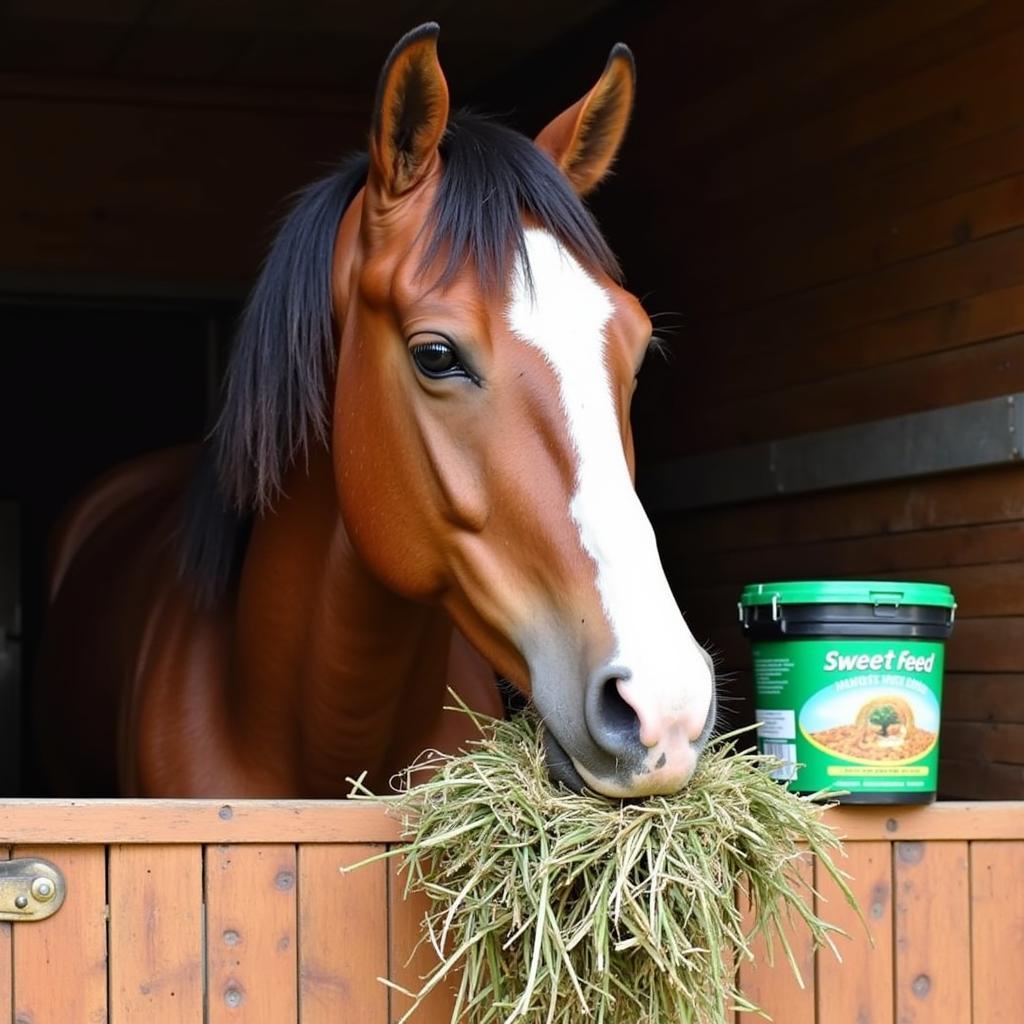Sweet feed for horses is a popular choice among horse owners. But is it the right choice for your horse? This comprehensive guide delves into the pros and cons of sweet feed, exploring its nutritional value, potential risks, and best practices for feeding. We’ll help you make informed decisions about your horse’s diet.
Understanding Sweet Feed: What Is It?
Sweet feed typically refers to a grain mix formulated with molasses, corn, oats, barley, and other ingredients. The molasses adds sweetness and palatability, making it appealing to horses, especially picky eaters. Sweet feeds vary significantly in their nutritional composition, catering to different life stages and activity levels.
The Nutritional Value of Sweet Feed
Some sweet feeds are fortified with vitamins and minerals, making them a convenient way to supplement a horse’s diet, particularly if they have limited access to quality forage. However, not all sweet feeds are created equal. It’s essential to carefully examine the ingredient list and guaranteed analysis to ensure the feed meets your horse’s specific needs. For horses prone to sweet itch, adjusting their diet is critical, and choosing the right sweet feed is one piece of the puzzle. You can learn more about what to feed a horse with sweet itch on our dedicated page.
Is Sweet Feed Right for All Horses?
While palatable, sweet feed is not a one-size-fits-all solution. Horses prone to metabolic issues, such as insulin resistance or Cushing’s disease, should avoid sweet feed due to its high sugar and starch content. Overconsumption of sweet feed can lead to weight gain, colic, and other health problems. For these horses, whole oats horse feed or other low-sugar options are a better choice.
Feeding Sweet Feed: Best Practices
If you choose to feed sweet feed, moderation is key. Always follow the manufacturer’s feeding recommendations and adjust the amount based on your horse’s individual needs, workload, and body condition. Divide the daily ration into several smaller meals to avoid overwhelming the horse’s digestive system.
Potential Risks of Sweet Feed
Overfeeding sweet feed can contribute to several health problems. The rapid release of sugars and starches can disrupt the horse’s hindgut microbiome, leading to digestive upset and potentially laminitis. Dental problems can also arise due to the sticky nature of molasses, which can adhere to teeth and promote plaque buildup.
“Sweet feed can be a useful tool in a horse’s diet, but it’s crucial to understand its potential drawbacks and feed it responsibly,” advises Dr. Emily Carter, Equine Nutritionist. “Always prioritize forage and consider sweet feed as a supplement, not the foundation of the diet.”
Incorporating Sweet Feed into a Balanced Diet
Remember, forage should always be the cornerstone of a horse’s diet. Sweet feed, if used, should complement a high-quality forage program, not replace it.  Horse Eating Hay with Sweet Feed Supplement Providing ample fresh water is also crucial for proper digestion and overall health. For a rewarding treat option, check out our article on what do horses like to eat as a treat. You might also consider supplementing with fly control supplement horses, especially during fly season.
Horse Eating Hay with Sweet Feed Supplement Providing ample fresh water is also crucial for proper digestion and overall health. For a rewarding treat option, check out our article on what do horses like to eat as a treat. You might also consider supplementing with fly control supplement horses, especially during fly season.
Conclusion
Sweet feed for horses can be a valuable addition to a horse’s diet when used judiciously. However, it’s crucial to understand the potential benefits and risks associated with this type of feed. By prioritizing forage, feeding sweet feed in moderation, and monitoring your horse’s health closely, you can help ensure your equine companion receives the optimal nutrition they need to thrive. Check out our guide on Purina sweet feed for horses for a specific brand recommendation.
FAQ
- Can I feed sweet feed to my pony?
- What are the signs of overfeeding sweet feed?
- Are there any alternatives to sweet feed?
- How do I transition my horse to a new feed?
- Can I mix sweet feed with other grains?
- Is sweet feed suitable for pregnant mares?
- How much sweet feed should I feed my senior horse?
Need more help? Contact us! Phone: 0772127271, Email: [email protected] or visit us at QGM2+WX2, Vị Trung, Vị Thuỷ, Hậu Giang, Việt Nam. We have a 24/7 customer support team.